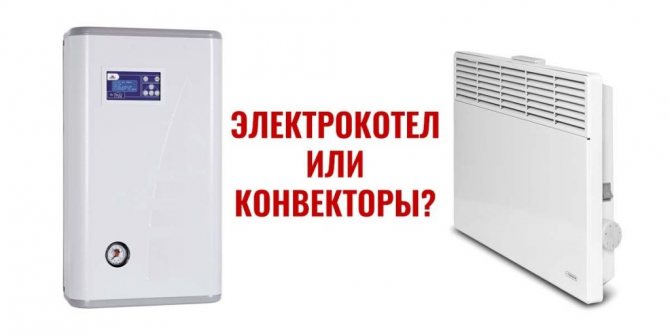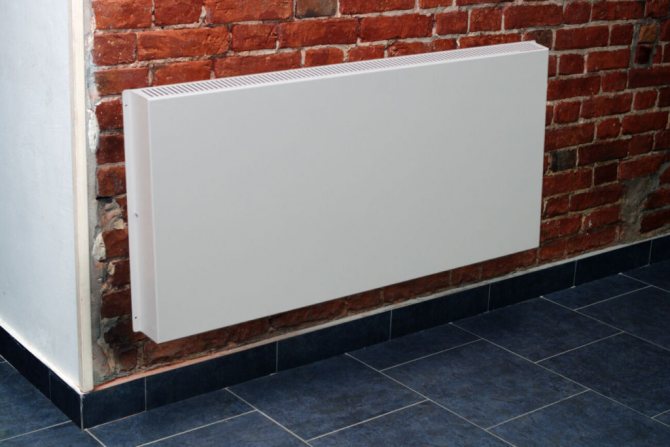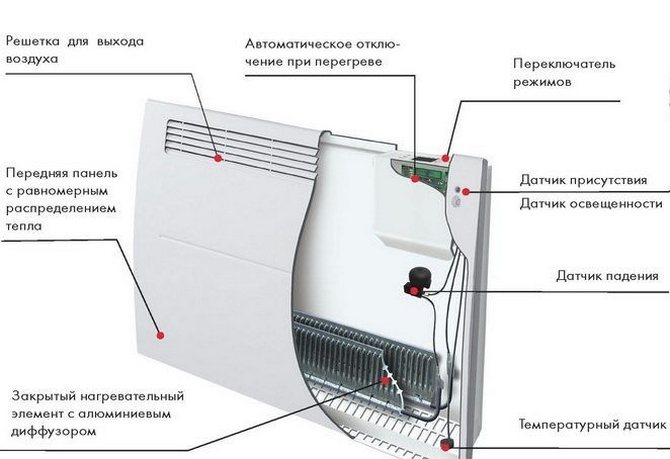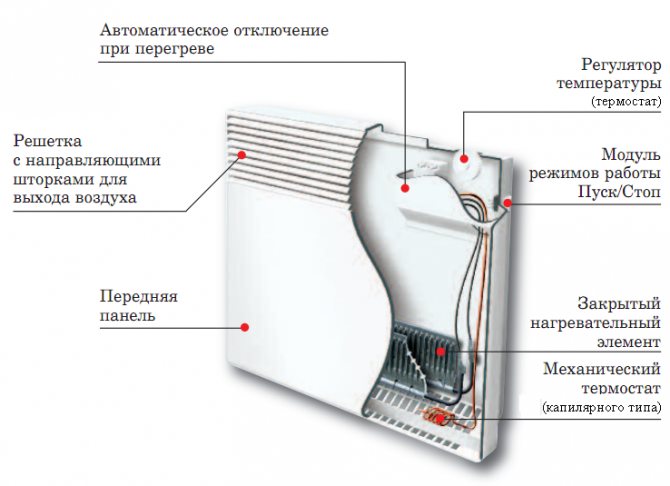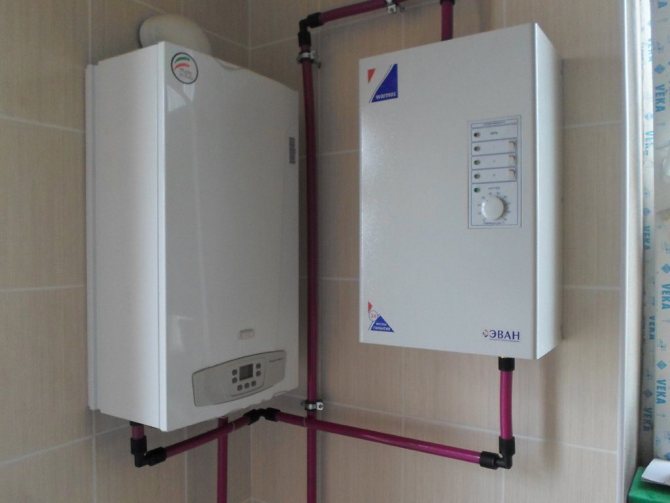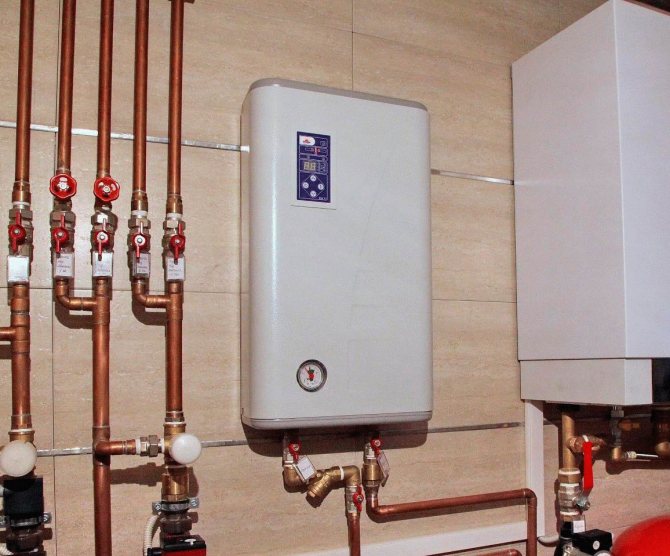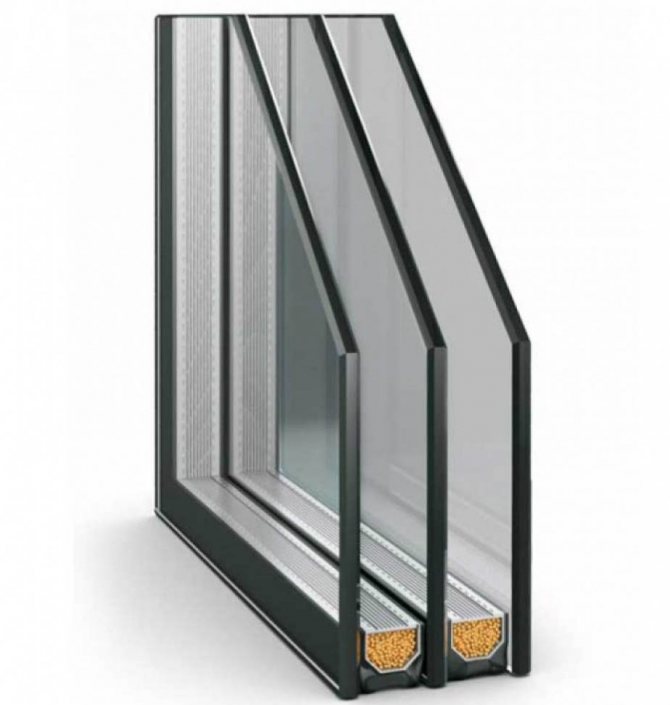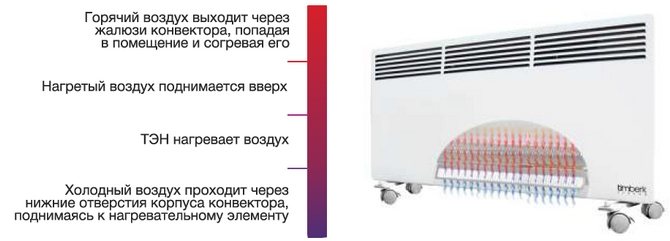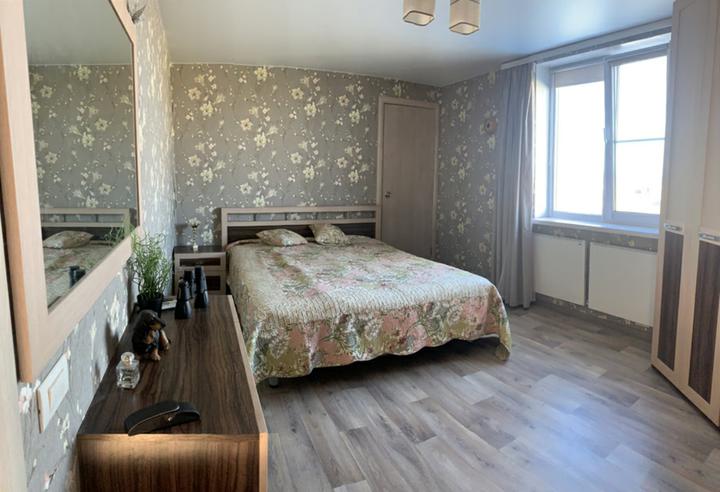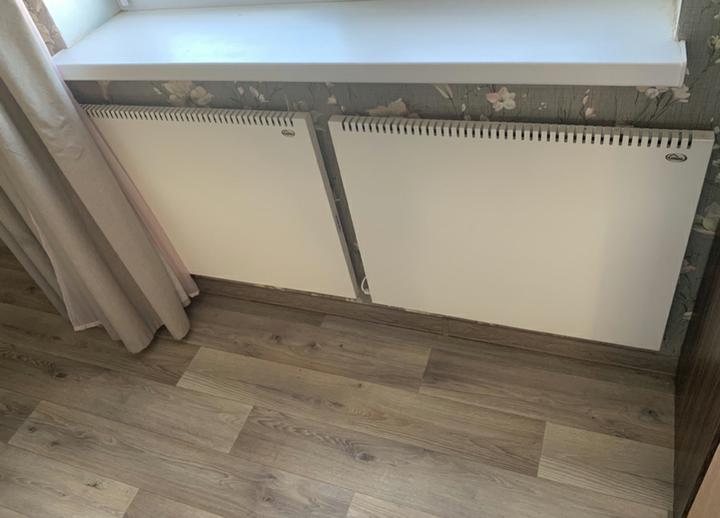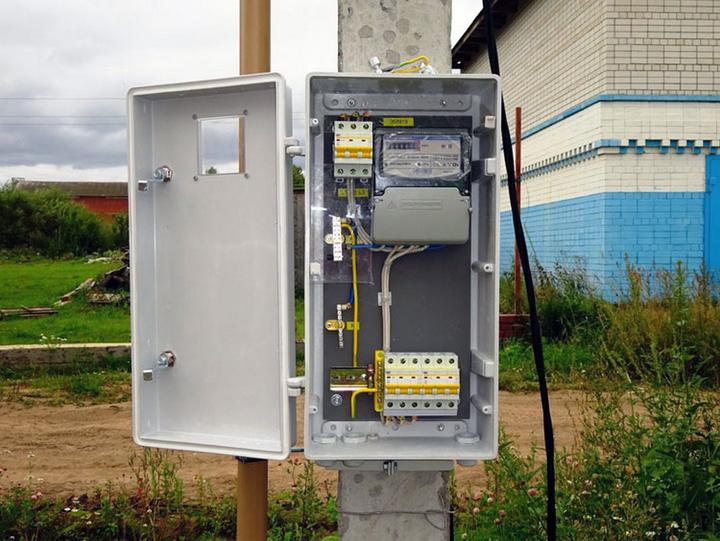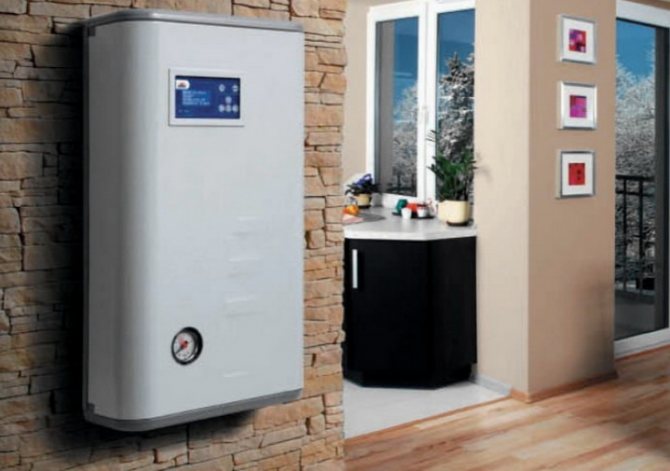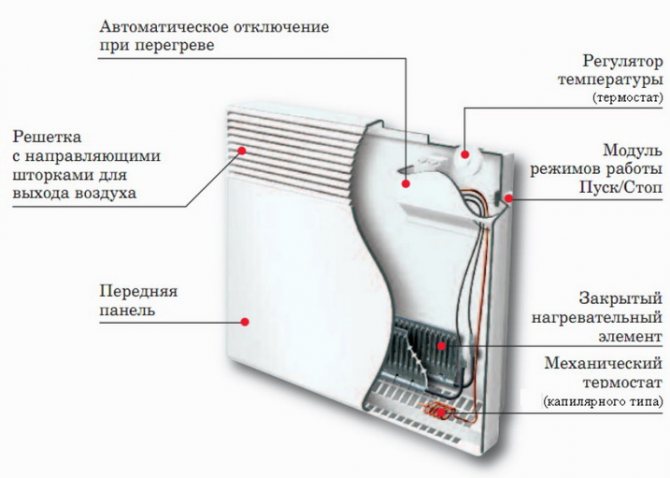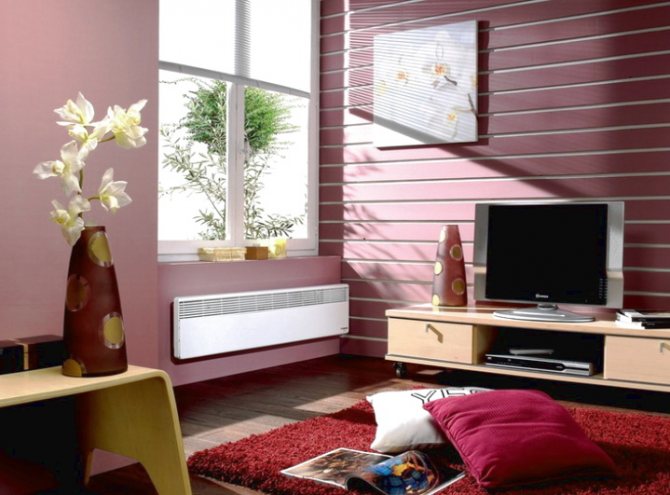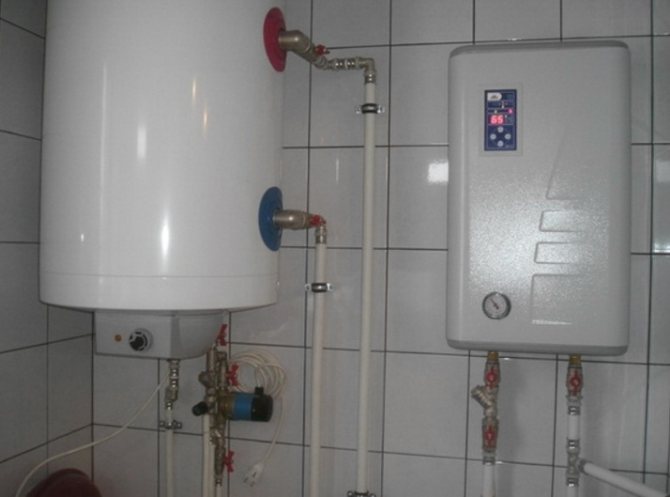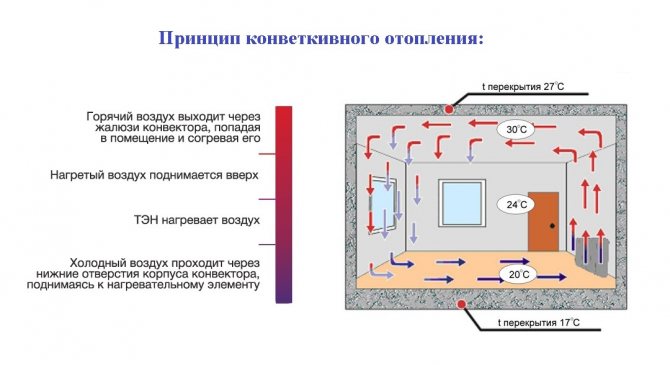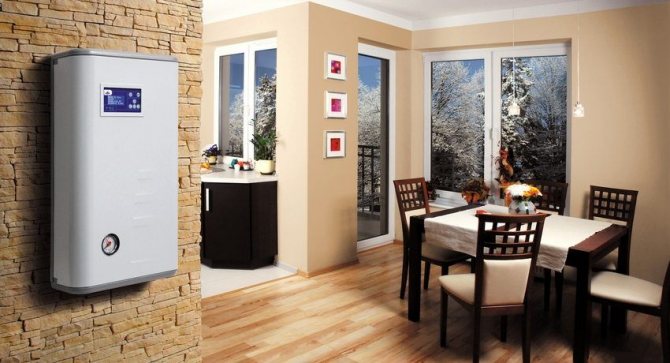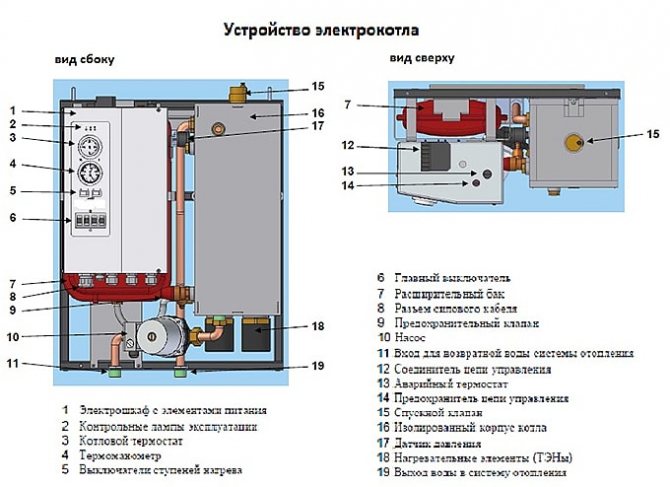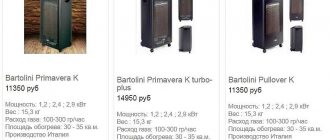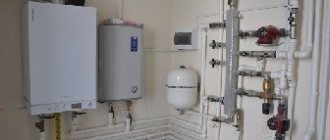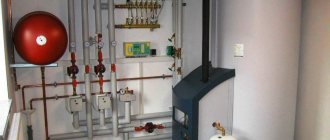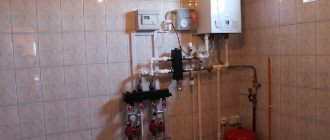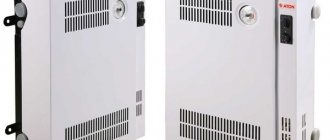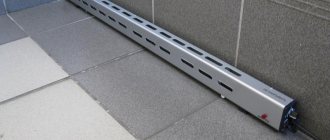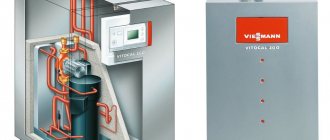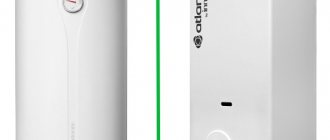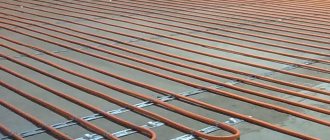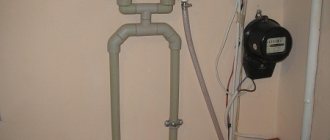Home / Electric boilers
Back to
Published: 30.05.2019
Reading time: 4 minutes
0
483
Before the user, when determining the method of heating his home, where it is not possible to conduct gas, there is a choice of which equipment to use: an electric boiler or a convector.
What is better to choose, because electric boilers and convectors are in demand almost equally. There are several factors to consider here. Each equipment has its own advantages and disadvantages. Let's consider in detail the heating means.
- 1 What is an electric convector
- 2 Pros and cons of convectors
- 3 Heating method 3.1 Boiler
- 3.2 Convector
Why an electric boiler can be cost effective
Many people say that electric boilers should not be installed in any home. After all, installing a boiler will be more expensive, and more effort will be required, however, this is not at all the case. Electric boilers began to be used to heat houses in order to save money. But the fact is that if there are few heating devices in the house, the economic efficiency from this method is invisible. But when there are a lot of devices, the savings become significant. However, it will not be visible to the naked eye, this economy must be definitely explained.
Often, people in their decision are based on only two facts: a boiler is much more expensive than several convectors, and the efficiency of these two options is approximately the same. It is about 98-99%. In this case, it turns out that it is much better to install cheaper convectors if their efficiency is the same as that of the boiler. In order to understand where the economic benefit from the boiler comes from, it is necessary to resort to a mechanistic formula, which sounds like this: lowering the air temperature in the room by 1 degree leads to energy savings by 6%. In simple words, this formula says that if the air is overheated by only 3 degrees, then 18% of the energy carrier is lost, hence the economic efficiency of the electric boiler in comparison with electric convectors.
The fact is that in the boiler you can set the power that will cover the heat loss at home for the air temperature that is now on the street. Consequently, the air in the room will not overheat and the boiler will spend exactly as much energy as is needed to ensure heat loss at home. But in convectors there is no way to set their power. Regulators on them allow you to set only the desired temperature in a given room. That is, regardless of the temperature you set, it will always work at its full capacity. And the convector will turn off only when the air is already overheated. After all, he sees a difference in air temperature only more than 2 degrees.
Thus, every time the air is heated, a certain amount of kilowatts will be lost, which were spent on overheating the air. Of course, from one time loss is very small and even insignificant. However, this will happen every time the room is heated. And if you have a large house with more than 6 electric convectors installed, you will definitely feel these losses. However, this is not the only plus of the electric boiler. Thanks to the presence of a buffer tank, the boiler can be charged at night at a cheap rate. Ari this day he will not waste electricity at all. And convectors do not have such an opportunity.During the heating of the air, they must be connected to the power supply.
And the third positive distinguishing feature of the boiler is that it can be integrated into the hydraulic system, that is, it can be used for combined heating together with a wood-burning stove, this is also done to save energy.
To summarize all of the above, it can be noted that there are only three points that indicate that it is better to put an electric boiler in a private house for heating than electric convectors:
- the boiler does not waste extra energy by overheating the air
- the boiler can store energy at night at a cheap rate and run on this energy all day
- the boiler can be used quite simply in a combined heating method
Electric boiler or convector?
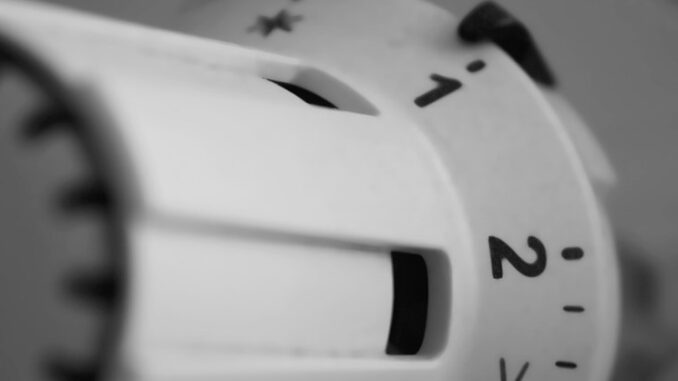
Electric convector
I want to draw your attention right away that heating a house with electricity is the most expensive of all possible options. But in some cases, and under certain conditions, it outperforms solid or liquid fuel systems.
What are the advantages of an electric heating system?
- Low cost of purchasing a home heating kit.
- No specific knowledge is required to connect and commission.
- There are no expenses for payment and delivery of fuel (firewood, diesel fuel, etc.).
- Maintenance and operational maintenance is not required (cleaning of burners, ash removal, lining of fuel in the combustion chamber).
- Electric heating starts and stops almost instantly.
- When installing systems similar to the "Smart Home" system, the heating system can be turned on and off by a call from a mobile phone.
- Compared to systems that use fuel combustion, the risk of causing a fire or fire is much lower.
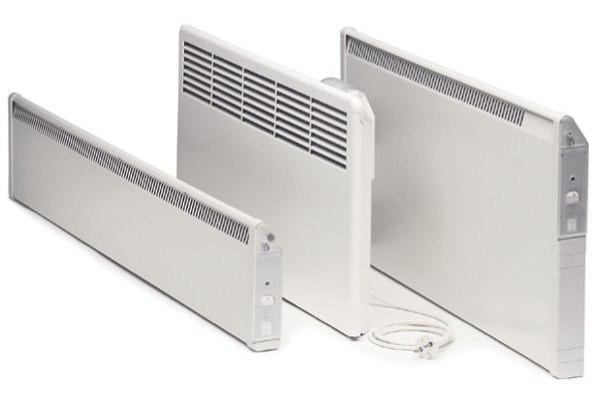

Electric convectors
What conditions should a house meet in order to make a choice in favor of an electric heating system, an electric boiler or convectors? Of course, when heating with electricity, the thermal insulation properties of the house, the thermal conductivity of walls and windows, the absence of drafts in the house caused by cracks in the walls, ceilings, windows, and high-quality insulation of walls and ceilings become very important. But this applies to any other heating system and it doesn't matter how heat is generated in the house from electricity, firewood, coal briquettes, or diesel fuel. No one wants to spend money on heating the street, just in a heating system that uses an electrical circuit to generate heat energy, these blunders are much more expensive than in systems running on gas or solid fuel.
But no less, and maybe even more important, is how much time you will spend at the dacha while the heating season lasts. What does it mean? Let's think and calculate how much it will cost you a day in a country house, for which electricity is used to heat.
Electricity tariff in the Moscow region 1р.93к. per 1 kW / h, and most likely the next few years, this tariff will only increase. An electric boiler or convectors are installed in your house at the rate of 1 kW per 20 cubic meters (when calculating how much power an electric boiler or convector will need, you should proceed from the volume of the room, not its area). The entire volume of the house that we need to heat is 300 cubic meters. (120-140 sq.m. with a ceiling height of 2.5-2.7 m), it turns out that for heating a house we need 15 kW per hour. The electric boiler, heating the liquid to the calculated 40-70g will switch to heating mode, it also applies to the convectors, heating the room to the calculated + 23-25g, depending on the model, either turn off or go into low power consumption mode and turn on when the temperature drops to + 18-20g.How long the electric body or convectors will operate at full capacity depends on many factors, ranging from the temperature outside the window, the thermal conductivity of the walls, and up to how often the front door is opened, but on average, the savings are 30%.
(15kW / h * 24h) -30%) * 1.93r. = 486.36r.
As you can see, one day at the dacha will cost us almost 500 rubles, and now you can easily calculate what the entire heating season will cost.
And so let's imagine, you visit the dacha from November to April 2-3 times a month, to relax, go skiing, check if everything is in order in the house. Arrive on Saturday at 11-13h and leave at 15-17h on Sunday. It turns out, a little more than a day, plus spend 3-4 days on New Year's holidays, in total, the heating system operates from November to April for about 20 days, and the cost of paying for electricity during this time will be about 10,000 rubles.
And from April to May, and from September to October you are at the dacha every weekend, that is, for almost two days, of course at this time the heating system will not work at full capacity. The temperature during this period, as a rule, is still quite warm, the house cools down and loses heat much more slowly than in winter at -20-25 outside the window, which means that much less electricity is required to maintain a comfortable temperature in the house. But it will still be necessary to turn on the heating system in order to ensure comfort, during this period it will consume about 50% of its capacity, and it will take another 5-7 thousand rubles to pay electricity bills. From mid-May to early September, as a rule, no or minimal heating is required.
In general, the cost of electricity for the entire season will be 15-17t.r.
Personal experience, a survey of acquaintances and communication on the forums confirm that this will be exactly the same amount for electricity, regardless of what the house is heated with by electric convectors or an electric boiler. Additionally, installing a fireplace or stove will help reduce the amount of electricity bills.
Of course, this amount is more than if you were heating the house with wood or coal briquettes, not to mention gas. But do not forget about the money that you saved on the purchase of equipment, connection, and fuel delivery. And then, unlike firewood or diesel fuel, it is more difficult to connect and steal electricity.
So, you can opt for an electric heating system only if during the entire heating season, in total, you will spend relatively little time there.
But if you, or one of your relatives, plans to spend more than 2-4 months from the heating season in total, or live in the country constantly, you should take a closer look, for example, at heating boilers operating on pilots. despite the higher starting price of 3.000-5000 euros, it will pay off in 3-5 seasons.
Having made a choice in favor of an electric heating system, the question immediately arises, what is more profitable to create a heating system with an electric boiler or to build a house heating using electric convectors?
An electric boiler is a rather powerful electrical device that, depending on the volume of the house, consumes from 12 kW to 25-30 kW, and at startup, the peak loads are even greater, and first of all, you should find out the very possibility of its installation.
What do you need to find out before installing an electric boiler?
- The true voltage in the network, often the voltage in the rural network is not 210-230V, but only 150-180V. Some models of imported boilers at this voltage may simply not start up.
- What power is supplied to the village or your line of houses. So, for example, if there are 60 houses in your summer cottage and electricity is allocated at the rate of 5 kW per house, when installing a boiler with a capacity of 30 kW, you will be in trouble with your neighbors.
- How much power is allocated to your home? In modern summer cottage associations, if electricity is connected at the rate of, say, 10 kW per house, a 10-12 kW automatic machine is often installed in the house in order to avoid a showdown between neighbors. And its unauthorized replacement threatens with serious trouble. For example, in the event of a fire, you may be accused of being your fault.
- Check the condition of the transformer installed in the village; you may have to pull separate wires to connect the electric boiler.
- What powerful electrical appliances are installed in the neighbors, and will their total power fall into the one that is allocated for their house.
Suppose everything is fine ... How to install an electric boiler and install convectors. What is more profitable than an electric boiler or an electric convector?
The dispute, which is more profitable than an electric boiler or an electric convector, is a dispute from the series "which is lighter than a kilogram of fluff or a kilogram of cast iron", since the consumption of electricity for heating 1 cubic meter. The volume of an electric boiler and electric convectors is the same, you can verify this by going to the website of any company that offers boilers and convectors, which means that the amount of the electricity bill will be similar. We would like to draw your attention to the fact that there is now massive advertising and promotion of electric convectors on the Internet and in many forums.
Here are some of the arguments put forward by supporters and sellers of convectors against electric boilers:
- The liquid used in the heating system and flowing through the pipes loses some of the thermal energy. This is only valid if the heating pipes are run from below into an underground area that is not heated. If they go along the walls of the rooms, then, accordingly, this heat energy will also go into the room.
- Electric convectors save electricity by precisely adjusting the temperature in each room. First: the boilers also have power adjustments and automation to reduce the temperature of the antifreeze in the system at night when you sleep. Second: if you are not going to sit closed in one room or in your open plan house, heat will flow from one room to another, and accordingly, in order to heat the incoming colder air, the convector will turn on, so you will not be able to save money. It is better to install all convectors in the house at + 22 - 25 g, there will be much more sense from this than if in one room the convector operates at + 25 g and in another it is adjusted to + 18 g, as a result you will get an arithmetic mean the amount of electricity consumption.
- First, you need to heat water or antifreeze in the system, the house heats up for a long time. Yes it is. But for some reason they forget that after the boiler is turned off, the antifreeze in the system will give off this heat for some time, so that part of the energy spent on initial heating "returns" and the house cools down more slowly, and you can start the electric boiler as well as a convector, by ringing for 2-3 hours before arrival.
- The boiler consumes more electricity. This is not true. Heating with an electric boiler or an electric convector requires the same power.
I do not urge you to recklessly make a choice in favor of an electric boiler, but I want to draw your attention to the fact that when choosing between an electric boiler and a convector, you should be guided by other reasons. An electric boiler should be preferred when:
The most important reason to opt for an electric boiler instead of electric convectors is that if you plan to put a boiler on liquid or solid fuel in the next 3-5 years, fold a stove or fireplace with a hot-water jacket, you still have to install radiators, pull pipes, and other. And so you will already have a ready-made system, and the electric boiler will enter it as a backup source, or so that you do not have to get up at three in the morning and put fuel on.
Electric convectors, unlike heating radiators, are much more popular with country thieves, and better liquidity in the sale.
And one more very important reason why people make a choice in favor of an electric boiler: When using convectors, many people have an unpleasant feeling that the microclimate has changed, and the air has become too "dry", or filled with an electromagnetic field. To find out your reaction to this, we advise you to first purchase and test one convector.
When is it more profitable to install convectors?
- If you do not plan to create a central heating system in the house
- If for some reason it is impossible to connect the electric boiler. In this case, you should reduce the volume of heated premises to the capacity that you have available.
- The area that needs to be heated is small and amounts to 20-40m2.
Here is a specific example from personal experience of what it costs to heat a small dacha of friends who live there in winter:
House 70 m2, walls wooden beams 150 mm, sheathed outside with clapboard, without insulation, inside lining with insulation in one layer of 50 mm insulation URSA. On the ground floor there is a small stove that heats about 30 sq.m., it is heated 1-2 times a day. The total power of the installed heaters is 7 kW. When the outside air temperature is -20, in the room +22, the average power consumption is 3.5 kW / h, during the winter month, 2,500 kW accumulates.
Discussion on the forum "
Difficulties in installing and using electric convectors
- Increased total power of electric convectors. Due to the fact that the power is selected for each individual room, there is always a loss of about 2-4 kilowatts. When all the convectors are turned on at their full capacity, in addition, other electrical appliances are working in the house, this can lead to knocking out the introductory machine. And you can fight this only by turning off the convectors in individual rooms manually, which is too troublesome.
- Electrical network. Due to the fact that the convector is a powerful electrical device, moreover, it works without stopping for at least 5 hours, a separate cable must be installed for it. That is, you cannot turn on the electric convector into any outlet that is in the house.
- It is difficult to control convectors remotely. It is quite possible to do this, but for this it will be necessary to combine all the devices into one network, and then connect them to some executive device that will receive commands from you. This will require additional cash costs.
It turns out that buying an electric boiler and installing electric convectors correctly will cost you about the same amount. The cost of an electric boiler during installation will be slightly higher, but it will pay off in the first year of its use.
Pros and cons of convectors
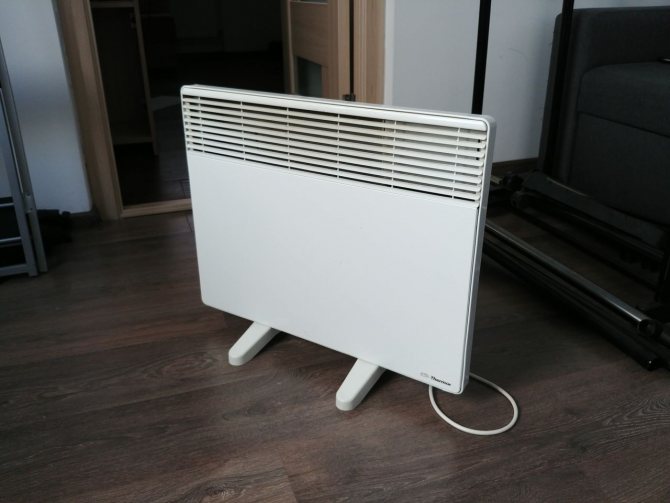

Convectors have high energy consumption
The advantages of this device are as follows:
- Easy to install - just install it on the floor or hang it on the wall and plug it in.
- Lack of coolant in the design. This prevents problems with fluid leakage from the circuit or a sticking valve that relieves steam pressure in the circuit.
- The ability to maintain the desired temperature only in those rooms where people are.
Disadvantages of convectors:
- high power consumption;
- slow start - the heater takes time to warm up before it starts to warm up the surrounding air;
- the need to lay pipes and install radiators in the case of installing a gas boiler;
- the device dries the air and this negatively affects the well-being of the residents of the house.
For which house is it more profitable to use convectors
Heating with convectors implies the installation of a separate heating device in each room. It is impossible to heat two or more rooms with one convector at the same time.
If the house is small and has no more than four rooms, then four heating devices will also be required to create comfortable conditions in it, if there are two rooms in the house, then two electrical devices are enough.
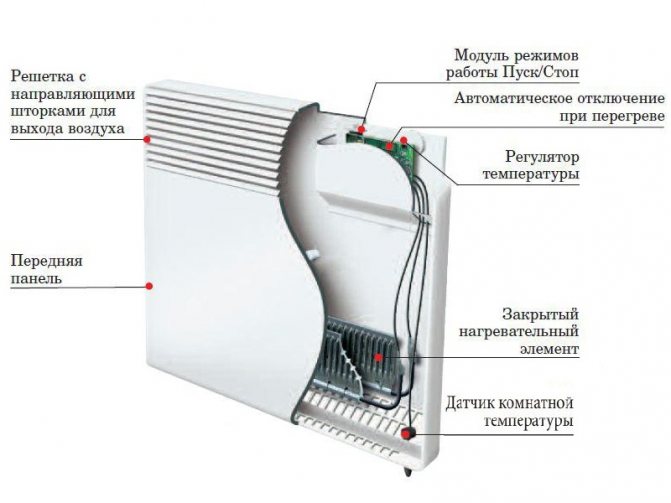

If we are talking about a building with a large number of rooms, it is more profitable to install a heating boiler. It is believed that a house, for which you need 4 convectors, can be heated using these devices, but if you need 6 or more convectors, then it is more economical to install a heating boiler.
This ratio was not chosen by chance.The fact is that during operation, a heating boiler allows you to heat a house at a lower cost compared to convectors. It's just that with a small number of heating appliances, this benefit is invisible, but with an increase in appliances, it becomes more tangible.
Best Answers
Boss Heat:
The store said correctly if the ceiling height is 3m. Electric convectors are the cheapest option in terms of equipment and installation costs. And you will pay for electricity from the money saved on equipment. You can increase the economy and comfort by connecting one convector through a room thermostat by air. The cheapest electric convectors are Chinese or joint production, cheap does not mean bad
Pay attention to the configuration of the heating element in the convector, if it is tubular with a screw tape around the tube (DELSOT) - it will be heard at night, as it clicks when cooling, heating. If we take more expensive convectors - Siemens, Atlantik, Nobo, then a thermostat in the air is built in them and they do not click
Installing convectors under windows, do not block curtains, do not dry things on them, do not block the air flow from above, that is, observe fire safety. Infrared lamps can be placed where there are no people and high ceilings. It is not comfortable under it. Particular attention is paid to the safety of electrical wiring.
Pavel Melnikov:
I heat it, sometimes it’s -30 outside the window I open the window in one room, I went too far, but I’m quite satisfied.
spiny hedgehog:
how much will you pay for electricity ????
& B:
In such frosts, a lot of energy will burn. Four kilowatts without switching off, Ten kilowatts per day. Heating is real if you spend the same money as for firewood on electricity. .But, in my opinion, it will be more expensive. Fan heaters heat well.
Sergunok:
depending on what permissible power (input machine) and in general in what state the wiring
Pie with kittens !:
did not come across ... on the contrary, I think why I took off the air conditioner for the winter - in a room below +30 only with an open balcony !!!! - they are drowning !!!!
Alexandra:
During the period when it is cold outside the window, and the heating is not turned on, I use a convector. It is very convenient, you turn it on at 22 degrees and this temperature is kept constantly. My relatives heat the house in the village. 1.5 kW at 18m.
Foolish number one and a half:
Infrared are demanding on dimensions - ceiling height, distances from the ceiling and walls. If the ceilings are low, they will be reachable, and the temperature is high, someone removing the sweater may burn themselves. It is inconvenient to use them for such housing. Better convectors. The calculation indicated is applicable.
Konstantin Lozhkin:
Infrared in the house as the main heating is insanity, a constant headache is provided. Convectors are good because they are inexpensive, easy to install and quite reliable. Of course, they said correctly about the selection of power, but with a ceiling height of no more than 2.8 meters and good thermal insulation. In general, I put a nobo in my house, divided it into 2 groups. Each group has its own thermostat. It is expensive to be heated purely on electricity, so I still heat the stove in the cold.
Yuri Dubov:
Dmitry! If you can survive the winter in the same mode, try to survive, in the spring and summer, schedule work on the insulation of the house, look at the technologies for pasting with foam, etc., there is a lot of interesting things, but only then do the heating. These works do not require special qualifications, but only then do the heating. I would recommend a combined heating system
Pay attention to electric boilers "beril", but first of all, eliminate the heat loss as much as possible, the costs will pay off
Artyom Shlentov:
For everyone who is interested, I suggest that you familiarize yourself with the table of electricity consumption by ceiling film electric heaters:
Natalia:
I heat 4 winters with noirot convectors France, I heat 94 squares, at - 10-20 degrees I cry 2300-2900 if -25-40 degrees I cry 3500-5000 the temperature is set to +22 in the whole house, “nobo” is also a cool manufacturer, all other convectors except "noirot", "nobo" are not intended for constant heating, the main house is well insulated and the wiring is good, I have a separate automatic machine for each convector, start with one convector, count how much electricity it eats and make a decision, the devices are very convenient, turned it on in autumn and turned it off in spring, it is convenient !!!
Features of electric boilers
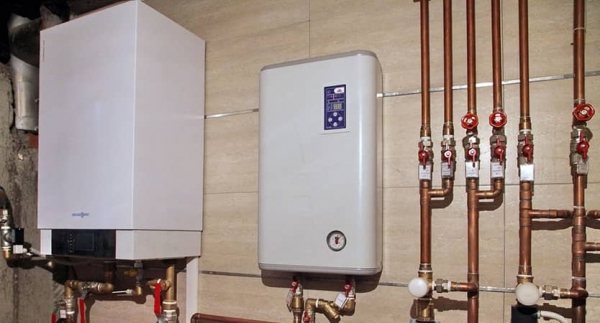

An electric boiler is a heating device that is capable of heating a large area, due to the provision of heat supply from a central heating device to the actual heat sources. That is, a heating device is located inside the boiler itself. It heats the water, and the water passes through the laid pipelines to the radiators (batteries), which are the sources of heating.
The peculiarities of electric boilers are that they:
- Do not dry the air. Does not burn oxygen, and does not create the sensation of being burned in air.
- You can pick up double-circuit models that can not only heat the room, but also provide hot water supply.
- Unlike single heaters, an electric boiler can effectively heat a fairly large area. After all, it is the center, the distributor of heat supply.
The price will also depend on the complexity of the installation itself. It can be noted that low-power simple installations are quite cheap.
Depending on the needs and the room where it will be used, you can choose a simple or more advanced version, in particular, boilers are distinguished:
Equipped with heating element and trigger for commissioning. In addition to standard installations, they are equipped with temperature control sensors. Advanced options include a remote control system.
What is an electric boiler
An electric boiler is a heating device, its principle of operation is to convert electrical energy into heat. The heating element acts on the flowing heat carrier circulating through the pipes of the heating system. In simpler terms, the vapors come into contact with water (or other chemical liquid), which moves through the pipeline, heating it. Radiators, in turn, heat the air.
Distinguish between electric boilers on several grounds. By the type of installation, the devices are divided into:
- wall-mounted;
- floor.
By types of heating elements:
- shadow;
- electrode;
- induction.
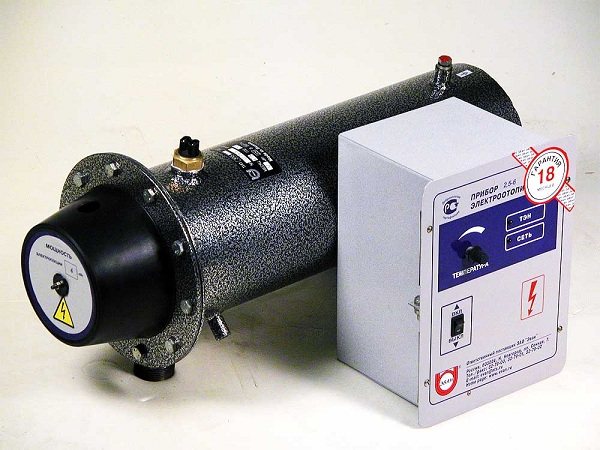

Induction Electric Boiler
Also, the models differ in power (energy consumption) and functionality. The most affordable and simple boilers contain a heater and starting equipment, medium-functional boilers are equipped with temperature control and monitoring units, and the most "top-end" ones are remotely controlled.
Note! Models with shades can have a double-circuit system, which will provide the house with not only heat, but also hot water.
The heating medium is distilled or salt water, and antifreeze can be added to induction boilers. In both cases, the cost of the liquid is quite low.
Boundary rule 4 and 6
In order to determine the best way to heat the house, it will be very important to know the size of the house, or rather, the number of necessary heating devices around the entire perimeter of the house. Experts were able to establish fairly clear boundaries
If the house is very small and only needs 4 heating devices, then there is no point in installing an electric boiler and a radiator network. In such a house it will be much easier and easier to install electric convectors. If the house is large enough and it already needs 6 heating devices, then experts definitely recommend purchasing an electric boiler.A rather difficult situation arises if 5 heating devices are enough for your house. Indeed, in this case, you can choose for yourself both the one and the other option.
Features of electric boilers
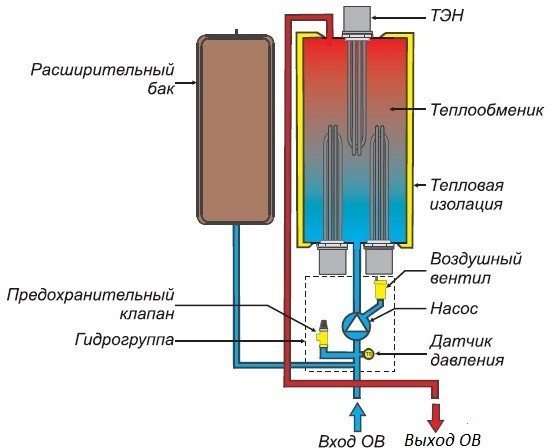

Electric boiler operation diagram.
Until recently, there was an opinion that an electric boiler is suitable exclusively for heating oversized premises. But this opinion turned out to be wrong. Today, the market in a wide variety is represented by electric boilers, the power of which ranges from 40 to 100 kW. Such equipment will easily be able to cope with the heating of a room, which has an area of up to 1000 m². In addition, an electric boiler is able to compete in a number of advantages with an oil boiler.
However, when choosing equipment, it is worth considering not only power, but also many other factors. An electric boiler will allow you to save money, because when purchasing it, you will need to pay only for the boiler itself, unlike, for example, liquid-fuel equipment, where you will have to pay extra for a hinged burner and a container. You can save money not only during purchase, but also during installation. Thus, the cost of installation work will be minimal. During operation, the electric boiler is also ready to show itself very positively, since it will not need constant maintenance and mandatory cleaning. The electric boiler will not need to
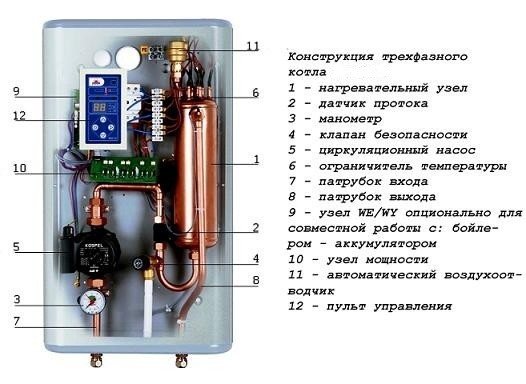

The design of a three-phase electric boiler.
fuel costs. Its use allows you to comply with all environmental requirements, and during operation it does not emit extraneous odors.
However, such devices still have drawbacks, the main thing is that when using them, it is not possible to allocate a sufficient amount of electricity power, which is necessary for operation, in addition, interruptions in the operation of power grids can affect the operation. But in case of power outages, the electric boiler can be used in parallel in the heating system with other types of boilers. A similar heating system has gained popularity in the recent period.
Electric boiler as a heat source in a private house
In cases where the owners of private houses want to carry out water heating with radiators, the choice between an electric boiler or convectors is clearly made in favor of the former. The electric boiler is the main element of the system; it heats the coolant, which then circulates through pipes and batteries.
It is very easy to organize such heating in a private house, since you can find all the necessary components on sale. If you choose the right electric boiler, you can heat housing of any size - both a small summer cottage and a large cottage with several floors.
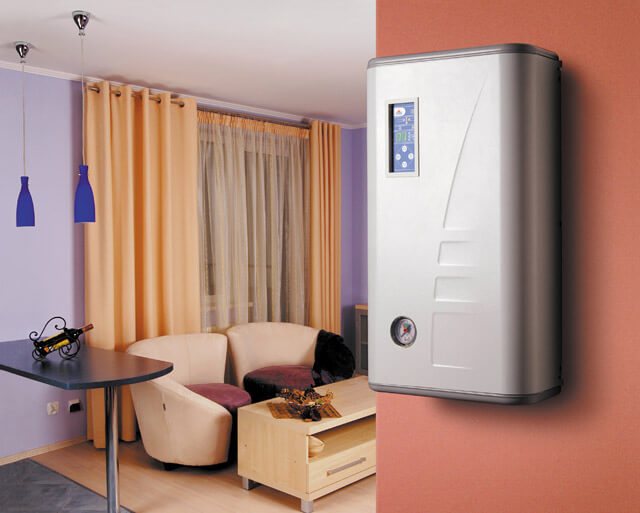

Consumers can choose from a large number of electric boilers of any design. The simplest units consist of a heat exchanger and automation for starting the system. Advanced boiler models have additional functions, in particular, they have built-in temperature control units. The most modern and high-tech electrical appliances allow remote control.
It is worth noting that simple models of low-power electric boilers can be purchased at a very affordable price, so that the total cost of heating equipment will not be too high.
Heating elements of electric boilers
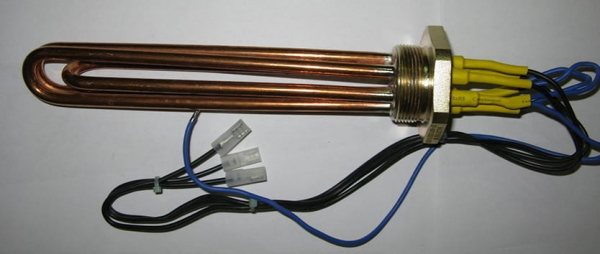

All electric boilers can be separated according to the type of heating element. Each of them has its own operating principle and features. And so, such boilers can contain:
TENA is a well-known and widespread method of heating water. The tubular heating element heats up the water, which moves and provides uninterrupted heat supply.
However, it has certain disadvantages. TENA often suffers from limescale from heating water and high temperatures. Because of this, it fails. This is solved by replacing the heating element. But it can still create discomfort during the heating season.

